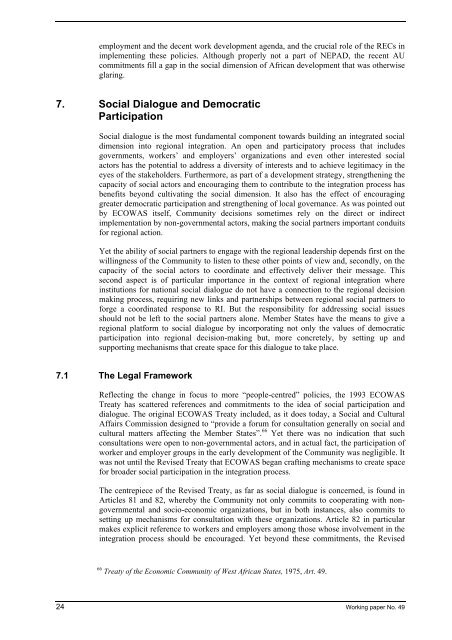The Social Dimension of Regional Integration in ECOWAS
The Social Dimension of Regional Integration in ECOWAS
The Social Dimension of Regional Integration in ECOWAS
You also want an ePaper? Increase the reach of your titles
YUMPU automatically turns print PDFs into web optimized ePapers that Google loves.
employment and the decent work development agenda, and the crucial role <strong>of</strong> the RECs <strong>in</strong><br />
implement<strong>in</strong>g these policies. Although properly not a part <strong>of</strong> NEPAD, the recent AU<br />
commitments fill a gap <strong>in</strong> the social dimension <strong>of</strong> African development that was otherwise<br />
glar<strong>in</strong>g.<br />
7. <strong>Social</strong> Dialogue and Democratic<br />
Participation<br />
<strong>Social</strong> dialogue is the most fundamental component towards build<strong>in</strong>g an <strong>in</strong>tegrated social<br />
dimension <strong>in</strong>to regional <strong>in</strong>tegration. An open and participatory process that <strong>in</strong>cludes<br />
governments, workers’ and employers’ organizations and even other <strong>in</strong>terested social<br />
actors has the potential to address a diversity <strong>of</strong> <strong>in</strong>terests and to achieve legitimacy <strong>in</strong> the<br />
eyes <strong>of</strong> the stakeholders. Furthermore, as part <strong>of</strong> a development strategy, strengthen<strong>in</strong>g the<br />
capacity <strong>of</strong> social actors and encourag<strong>in</strong>g them to contribute to the <strong>in</strong>tegration process has<br />
benefits beyond cultivat<strong>in</strong>g the social dimension. It also has the effect <strong>of</strong> encourag<strong>in</strong>g<br />
greater democratic participation and strengthen<strong>in</strong>g <strong>of</strong> local governance. As was po<strong>in</strong>ted out<br />
by <strong>ECOWAS</strong> itself, Community decisions sometimes rely on the direct or <strong>in</strong>direct<br />
implementation by non-governmental actors, mak<strong>in</strong>g the social partners important conduits<br />
for regional action.<br />
Yet the ability <strong>of</strong> social partners to engage with the regional leadership depends first on the<br />
will<strong>in</strong>gness <strong>of</strong> the Community to listen to these other po<strong>in</strong>ts <strong>of</strong> view and, secondly, on the<br />
capacity <strong>of</strong> the social actors to coord<strong>in</strong>ate and effectively deliver their message. This<br />
second aspect is <strong>of</strong> particular importance <strong>in</strong> the context <strong>of</strong> regional <strong>in</strong>tegration where<br />
<strong>in</strong>stitutions for national social dialogue do not have a connection to the regional decision<br />
mak<strong>in</strong>g process, requir<strong>in</strong>g new l<strong>in</strong>ks and partnerships between regional social partners to<br />
forge a coord<strong>in</strong>ated response to RI. But the responsibility for address<strong>in</strong>g social issues<br />
should not be left to the social partners alone. Member States have the means to give a<br />
regional platform to social dialogue by <strong>in</strong>corporat<strong>in</strong>g not only the values <strong>of</strong> democratic<br />
participation <strong>in</strong>to regional decision-mak<strong>in</strong>g but, more concretely, by sett<strong>in</strong>g up and<br />
support<strong>in</strong>g mechanisms that create space for this dialogue to take place.<br />
7.1 <strong>The</strong> Legal Framework<br />
Reflect<strong>in</strong>g the change <strong>in</strong> focus to more “people-centred” policies, the 1993 <strong>ECOWAS</strong><br />
Treaty has scattered references and commitments to the idea <strong>of</strong> social participation and<br />
dialogue. <strong>The</strong> orig<strong>in</strong>al <strong>ECOWAS</strong> Treaty <strong>in</strong>cluded, as it does today, a <strong>Social</strong> and Cultural<br />
Affairs Commission designed to “provide a forum for consultation generally on social and<br />
cultural matters affect<strong>in</strong>g the Member States”. 66 Yet there was no <strong>in</strong>dication that such<br />
consultations were open to non-governmental actors, and <strong>in</strong> actual fact, the participation <strong>of</strong><br />
worker and employer groups <strong>in</strong> the early development <strong>of</strong> the Community was negligible. It<br />
was not until the Revised Treaty that <strong>ECOWAS</strong> began craft<strong>in</strong>g mechanisms to create space<br />
for broader social participation <strong>in</strong> the <strong>in</strong>tegration process.<br />
<strong>The</strong> centrepiece <strong>of</strong> the Revised Treaty, as far as social dialogue is concerned, is found <strong>in</strong><br />
Articles 81 and 82, whereby the Community not only commits to cooperat<strong>in</strong>g with nongovernmental<br />
and socio-economic organizations, but <strong>in</strong> both <strong>in</strong>stances, also commits to<br />
sett<strong>in</strong>g up mechanisms for consultation with these organizations. Article 82 <strong>in</strong> particular<br />
makes explicit reference to workers and employers among those whose <strong>in</strong>volvement <strong>in</strong> the<br />
<strong>in</strong>tegration process should be encouraged. Yet beyond these commitments, the Revised<br />
66 Treaty <strong>of</strong> the Economic Community <strong>of</strong> West African States, 1975, Art. 49.<br />
24 Work<strong>in</strong>g paper No. 49

















